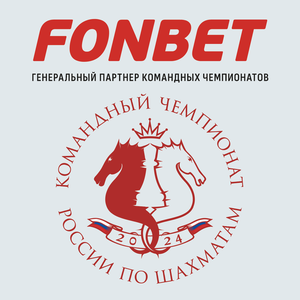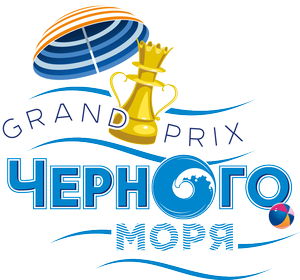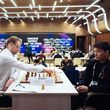Father of Rapid Genre
Results of the rapid part of the Tal Memorial reported by Eteri Kublashvili
Viswanathan Anand is out there time and again to admire his huge army of fans, winning rapid chess tournaments confidently and with inspiration. At the end of last year, the great Indian became the rapid world champion in Saudi Arabia, and here he is winning the Tal Memorial in a splendid manner. This is how it happened.
In round seven only one other than draw game was played; however, if Karjakin-Anand and Gelfand-Mamedyarov encounters developed relatively calmly and ended in logical draws, the remainder of games saw a lot of exciting stuff on the board.
Hikaru Nakamura managed to introduce complication in the Grünfeld middlegame against Vladimir Kramnik, upon which the 14th world champion committed an annoying blunder:
Nakamura – Kramnik
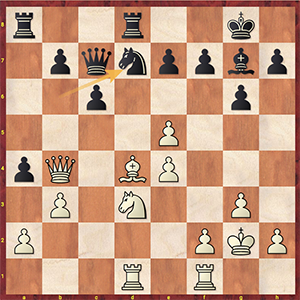
24. e6! Bxd4 25. exf7+ Kxf7 26. Qxd4 axb3 27. axb3 Nf8?
To deal with the king’s uncomfortable feelings Black decides to assign the defensive duties to his knight, overlooking the opponent queen’s direct infiltration into his camp.
Preferable was 27…Qd6 to reroute it to the kingside via f6.
Nakamura’s conversion in the technical phase was precise: 28. Qh8 Ke8 29. Nc5 Kf7 30. e5 Qc8 31. e6+ Nxe6 32. Qxh7+ Ng7 33. Rde1 Rg8 34. Re6 Qd8 35. Qxg6+ Kf8 36. Re3 1-0.
A really mind-boggling game was played between Alexander Grischuk and Peter Svidler. In a sharp middlegame of the Grünfeld Defence Black first won a pawn, and then, upon massive trades, a second one. In a severe time trouble the game transposed into a queen and bishop ending, in which White showed a fair amount of resourcefulness and, combining checks with threats to pieces, had one pawn returned. Nevertheless, Svidler’s position remained overwhelming due to three connected passers on the queenside. There arrived a moment when Black pushed his king out of the opponent queen’s checks into the wrong direction, which allowed White bailing out with a perpetual.
Game of the round (according to Sergey Shipov, and, perhaps, of the whole tournament as well) was that played between Dubov and Nepomniachtchi and lasted 106 moves. It goes without saying that a game like this deserves a dedicated analysis. White gave up three pawns for initiative in the Queen’s gambit, then followed it up by two more pawns. Sergey Shipov noted that if this line was a fruit of Daniil’s computer preparation, it was simply nothing short of being brilliant. One way or the other, Black thought it best to trade a queen and a minor piece for a pair of rooks. Nepomniachtchi outplayed his opponent in the endgame and seemed like on the verge of scoring his first tournament victory. However, Daniil defended ingeniously, and, apparently, fate seemed to appreciate his courage and tenacity: White did not go down at once, and even after going through a completely hopeless position he still managed to snatch a draw with only seconds on clock.
In the penultimate round Viswanathan Anand made a huge step towards the top place by defeating Alexander Grischuk. Anand assessed the game as a very exciting one.
Viswanathan Anand: “This opening (the Sicilian Rossolimo - ed.) used to be very popular some 15 years ago, but there has been a lot I failed to recall. Nevertheless, after 18. Nf5+ Bxf5 I felt that everything was under control. Even if I am not winning, I am definitely better. Then I capitalized on the ideas connected with my play via the g5-square.
Anand – Grischuk
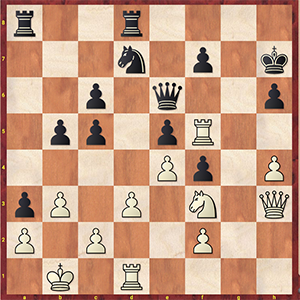
“I thought that I was better after 26. Rf5. We both looked into 26…f6 27. Ng5+, which seemed interesting anyway. Meanwhile, I saw the followup to 26...Rg8? even during the game. In the post mortem Alexander proposed 26…Kh8! In this case I would need to keep my play going with something like 27. Rh1”.
27. Ng5+ hxg5 28. Rxf7+ Qxf7 29. hxg5+ Kg7 30. Qh6#.
Meanwhile Daniil Dubov was about to deliver a blow to Anand’s main pursuer Shakhriyar Mamedyarov. And he did it. Shakhriyar, playing White, gained an opening advantage and tried to cash in by sacrificing a pawn for initiative, but faced an accurate defense from Black. Following a row of complications and exchanges Daniil remained up material for a while, but Mamedyarov managed to win back a pawn. Shakh committed a decisive error when the material balance was already restored.
Mamedyarov – Dubov
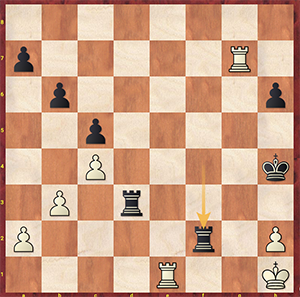
50. Kg1?
The engine proposes a too cold-blooded 50. Rxa7, which could be followed up by something like: 50...Rdd2 (50... Kh3 51. Rh7 Rxh2+ 52. Kg1 Rg3+ (in the case of 52... Rg2+ 53. Kh1 Rd6 54. Re3+ Rg3 55. Rxg3+ Kxg3 Black is slightly better, but a remote passer should be enough to bail out.) 53. Kf1 Rf3+ 54. Kg1) 51. Rg7 Rxh2+ 52. Kg1 Rxa2 53. Re4+ Kh5 54. Re5+.
However, it is contrary to human nature to grab pawns on the queenside when your king is in danger.
50…Rxa2 51. Rf1 Rxb3 0-1.
The Svidler-Gelfand and Kramnik-Nepomniachtchi games had tense struggle going on, but both ended in draws. Sergey Karjakin was very close to defeating Hikaru Nakamura, who refused from repeating moves and found himself in a worse position. A single inaccurate move by the Russian In a very bad position for Black allowed the American to deliver a perpetual after sacrificing a rook.
After round eight I asked Sergey Shipov to sum up the pre-final results and give his opinion on the participants’ performance.
Sergey Shipov: “Anand is impressive, no doubt about it, as if advanced age has absolutely no grip on him. His class is clearly the highest one, and it is extremely difficult to oppose him when he is in good shape. He will be definitely missed in the Candidates tournament, that I can tell for sure. Is it high time the tournament lineup is expanded? To something like 10 players. The way it is now it does not admit all strongest contenders. On the other hand, Anand’s play has been very fast since childhood, and this chess genre has always worked especially well for him, that’s why it is only natural for him to play strong rapid chess.
As for the Russians, Grischuk and Kramnik have demonstrate decent play in the majority of games. Danya Dubov has come up big with bright victories, although it was clear in advance that he would be up against it competing with the “heavyweights” of the chess world. It is essential that he gains experience.
It has been a lot that I expected from Ian Nepomniachtchi. He is coming into a real chess maturity, and I do believe that it was Ian who should have contested for the highest place in this tournament. This is exactly what he failed to achieve for some reason. Is it fate’s way of paying back its debts? It was Ian who has scored a brilliant victory in a recent Region Group of Companies blitz tournament. However, this is just idle talk. I hope Ian’s next victory is going to be in tomorrow’s blitz tournament.
Sergey Karjakin impresses everyone with his massive draws, but it is only in the tournament standings. Sergey is after real battles over the board, introducing complications and facing his opponents going all out at him. However, the shield invariably ends up superior to the sword This is some sort of a heavenly conspiracy. It looks as though some higher powers stop him from scoring sure victories. I hope that his luck will transfer itself to Berlin, where he is going to need only three or four victories. This is an absolutely achievable goal for as many as 14 rounds, the current Memorial being just a good warmup.
Yet another Candidates tournament participant Shakhriyar Mamedyarov was in the lead from the very start, but was stopped by Dubov. Strange as it may seem, I think Daniil’s committing a grave blunder out of the opening had much of the wind knocked out of his sails. It has been definitely a bitter and disappointing defeat. Apparently, chess gods again show Shakhriyar that there is no thinking small of others, that you need to keep concentration and not forget that opponents are also strong players. He is going to definitely to keep it in mind while in Berlin.”
In the final round, Sergey Karjakin managed to turn the tables and shut the door with a bang by defeating Vladimir Kramnik. White opened the game with 1.b3, and this strategy succeeded. Sergey successfully deployed his pieces, training his bishops and queen at the opponent’s king. Black tried to upset the enemy’s harmonious game by giving up a pawn, but after the trade of rooks it became even harder for him. White enjoyed an easy and straightforward play, and Kramnik resigned on move 40 in an absolutely hopeless position.
All other games ended in draws.
A clear first was taken by Viswanathan Anand with 6 out of 9. With one point behind are Shakhriyar Mamedyarov, Sergey Karjakin and Hikaru Nakamura. Additional tie breakers landed Mamedyarov second, Karjakin third.
Final tournament standings:
1st. Viswanathan Anand - 6; 2-4. Shakhriyar Mamedyarov, Sergey Karjakin, Hikaru Nakamura - with 5; 5-6. Boris Gelfand, Alexander Grischuk - with 4,5; 7-8. Vladimir Kramnik, Daniel Dubov - with 4; 9-10. Peter Svidler, Ian Nepomniachtchi with 3.5.
When the event was over, Vishy Anand was pressed from all sides by representatives of mass media and chess fans. Some people were given autographs, yet others - interviews.
- Vishy, my congratulations on your victory! Please share your impressions of the tournament.
- Thank you. On day two my victory over Hikaru was very important. I played a good game, but actually I made a mistake in the bishop ending, and he could have escaped. The funny thing is we were both trying to avoid his game with Garry Kasparov in Saint Louis and we blundered into that same position anyway. Although a very strange game, it put me in contention of first place.
Day three started with a comfortable draw with Sergey. The next encounter with Alexander was very exiting, and when it was over I learned that Mamedyarov had lost his game. So, I only needed a draw in the ultimate round. I think I played a very good game against Boris in the last one as well. After 15. Bxc6 I hesitated because I was slightly better already: One the one hand I felt I could play on, but on the other hand I wanted to win the tournament. We agreed to a draw.
- How do you feel like playing in museums, particularly in the Museum of Russian Impressionism? Was it noisy for you?
- Not at all, it has been a pleasure to play here. Somehow, two years back it was also very nice to play on the third floor, but I do not think people were able to watch us from outside. This time the spectators have been given such an opportunity. The museum is a spectacular venue, and it is nice to look out and see a portrait or some painting of nature. While thinking about chess, this is a very nice thing indeed. This is an idea that the Russian Chess Federation has been implementing for a while already, and it is a very good idea.
- It has been going on since your match with Boris Gelfand in the Tretyakov Gallery (supported by the Timchenko Foundation – ed.).
- Exactly! Yes, Chess in Museums is a beautiful idea.
- You are going to play in the World Chess Olympiad after many years of not playing in it. What was the impulse for you?
- To be honest, many years it was difficult to participate in the Olympiad because of my world championship matches. In 2012 and 2014 I did not feel like being part of the Olympiad. You know, we have lots of very strong players, and I am kind of open to the idea again.
***
March 5 the Central House of Chessplayer schedules the second half of the Tal Memorial - a blitz tournament. Ten players of the rapid section will be added by Vladislav Artemiev, Dmitry Andreikin, Vladimir Fedoseev and Alexander Morozevich.
Round one starts at 14:00. The entry is free. We invite chess fans to the most dynamic part of the supertournament dedicated to the memory of the 8th World Champion Mikhail Tal.








